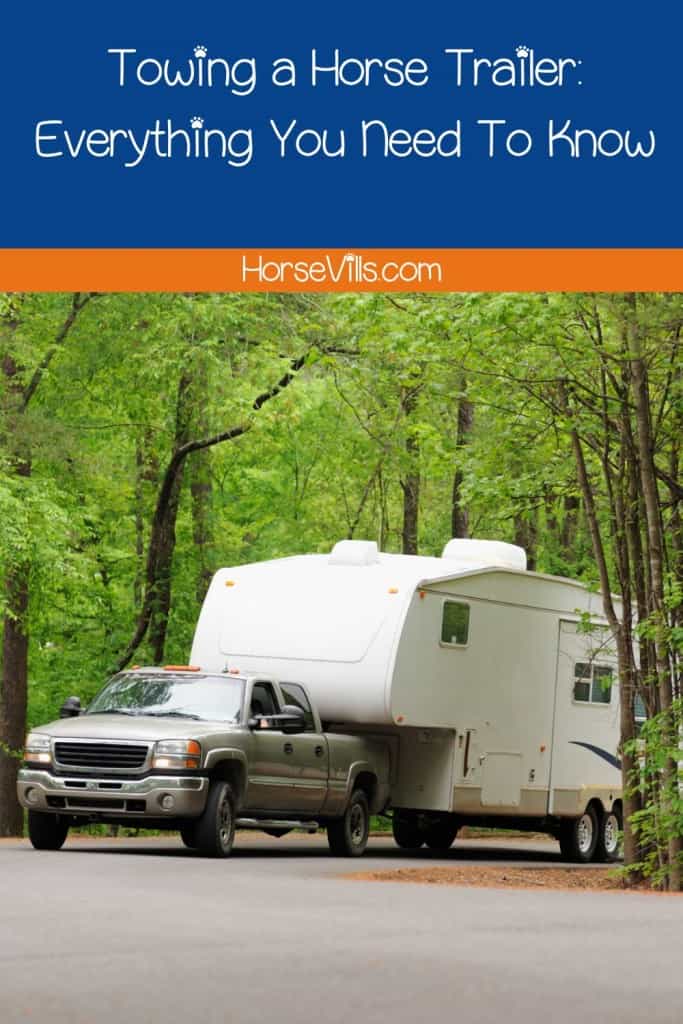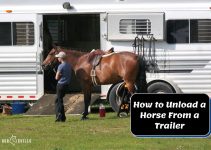Towing a horse trailer is something every horse owner does at least once in their careers, especially if they love to show and trail ride.
However, you must be a careful driver and ensure your horse is safe in transport because transportation-related injuries, such as mechanical failures and horse injuries, can frequently happen (1).
To ensure the best possible trip when towing a horse, choose the right hitch for the trailer and hitch parts, check the weight capacity of the trailer and license plate, and make sure your truck can safely pull your horse trailer.
Read on to find out more about best towing vehicles for horse trailers and what you can do to make your trip more successful.
CHECK: What Are the Best Quality Horse Trailers?
Table of Contents
Key Takeaways
- Make sure you choose the right hitch for your trailer and assess the hitch components before each drive.
- Always know the maximum weight capacity of your trailer and tow vehicles.
- You do not need a special license to tow a gooseneck trailer or any type of horse trailer.
Things You Need to Know for Towing a Horse Trailer
Here are a few things you need to be aware of before towing a horse trailer. Checking for these factors helps ensure the safest possible trip.
1. Choose the Right Hitch
The hitch is what connects the standard horse trailer to your vehicle. The three most common types of horse trailer hitch are the weight-carrying hitch, the weight-distributing hitch, and the gooseneck hitch.

- Weight-carrying hitch – fixed directly on the bumper and carry all of the trailer weight, meant for light loads.
- Load-equalizer hitch (weight-distributing hitch) – consists of a receiver or square tube, a hitch plate, and a receiver ball, and the hitch frame is designed to distribute weight evenly. These are typically two, three, and four-horse trailers.
- Gooseneck hitch – a hitch mounted in the middle of a truck bed makes the trailer more stable and allows for the pulling of larger loads. They are used for four-horse or larger trailers.
Trailer hitches can also be divided into classes based on the following criteria:
- Class 1 hitch – a lightweight receiver hitch that is simply made and most commonly used to mount bikes and other small pieces of cargo, including small enclosed trailers. It can haul 2,000 lbs or less and has a tongue weight of 200 lbs or less.
- Class 2 hitch – regular duty receiver hitches installed onto vehicle frame and used for towing ATVs, small boats, and 12 ft trailers. Can withstand 3,500 lbs of towing weight and 300 lbs of tongue weight.
- Class 3 hitch – heavy-duty frame-mounted hitch, Can haul up to 10,000 lbs of towing weight and 750-1,000 lbs of tongue weight. The most common type is used for a 2-4 horse trailer.
- Class 4 hitch – used for trailers longer than 12 ft. Can safely haul 10,000 to 14,000 lbs of tow weight and 1,000 to 4,000 lbs of tongue weight.
To choose the right hitch, consider the size of the horse trailer you have and the amount of weight you will be pulling or the combined weight rating. If the trailer is too heavy for the hitch, you risk the bumper of your tow vehicles coming off.
Also, research and see what class of hitch your tow vehicles can handle to minimize accidents, decide between round and square tubing, and consider hitch accessories if needed.
Most horse trailers need a class 3 hitch because they can support standard two-horse trailer weight.
2. Check the Hitch Components
The hitch components on a horse trailer are the receiver, ball mount, and ball.
Before towing a horse trailer, you need to make sure the hitch parts fit with your standard trailer and are secure, and can support the weight of the hitch and trailer.
The components you need to check for their actual weight capacity and tow rating include:
- The hitch ball – the rounded piece that connects to the hitch receiver, the max tow rating is written on top of the ball, and the thicker the shaft, the more weight the ball can take.
- Slide-in ball mount – supports the hitch ball. The rating is on the side and should match that of the ball, and it should fit into the mount.
- Coupler – the coupler and the ball work together to hook the trailer to your truck or car. To find the rating and size, look for etching in the metal.
3. Check the Maximum Weight Capacity
If you do not check the maximum capacity of the trailer, you are putting yourself and your horses at risk. Find the weight capacity of your trailer and other trailer parts using the following:
- Trailer weight – either locate the specifications sticker or your trailer or weigh it at a truck stop.
- Gross vehicle weight – add the weight of your horse or horses to the trailer weight and everything else you take with you in your trailer, including yourself and passengers.
- Combined vehicle weight rating – weigh the complete trailer rig, and add the weight of the loaded horse trailer.
- Tongue weight – found through your trailer manufacturer, should be 10 to 20% of the empty trailer weight.
Here is a video showing how you can weigh a trailer at home to ensure you get the accurate weight and that it can handle a heavy load.
4. Do You Have the Right Driver’s License?
If you are hauling your horse for recreational purposes, you do not need a commercial driver’s license, which is typically required for truck drivers, unless the gross vehicle weight restriction is more than 10,000 lbs. (2)
5. How Much Towing Capacity Do I Need For a Horse Trailer?
The Ram 1500 gooseneck horse trailer is one of the most popular horse trailers. Class 3 hitches are most used for horse trailers, and they can handle up to 10,000 lbs of towing weight.
The average minimum ram 1500 gooseneck tow capacity is 7,500 lbs.
Best Trucks for Towing a Horse Trailer
Pickup trucks are the superior towing vehicle. Here are the best trucks for doing so
- Dodge Ram 3500 – can tow up to 31,000 lbs, class 5 hitch receiver.
- Ford F-350 – can tow up to 32,000 lbs, good fuel efficiency.
- Chevrolet Silverado 3500 – can tow up to 20,000 lbs, trailer sway control.
These are the top three best trucks for towing. Even though the models are a few years old, they are reliable and safe.
FAQs
Do your trailer and full-size truck need special inspections?
If you are pulling a horse trailer, you must stop at the designated highway weigh stations along your route for inspection.
Do you need the training to tow a trailer?
You do not need any special certification or license to tow a trailer. However, it is still essential to seek out training yourself to tow safely.
Can you overtake while towing a trailer?
This depends on the size and weight of the trailer and the truck’s towing capacity.
Conclusion
If you want to travel with your horse, it is important to know how to tow a horse trailer so that you can be safe on the road. Always choose the right hitch, and check on the hitch components before driving, to minimize the risk of accident or injury.

What do you think of this topic? I would love to hear your thoughts below!
References
- 1. Riley C, Noble B, Bridges J, Hazel S, Thompson K. Horse Injury during Non-Commercial Transport: Findings from Researcher-Assisted Intercept Surveys at Southeastern Australian Equestrian Events. Animals. 2016;6:65.
- 2. STATE OF CALIFORNIA -DEPARTMENT OF CALIFORNIA HIGHWAY PATROL [Internet]. 2020. Available from: https://www.chp.ca.gov/CommercialVehicleSectionSite/Documents/IB%20California%20Driver%20License%20Requirements%20for%20Towing%20Trailers.pdf
Bryanna is a 23-year-old Florida-based Grade 1 Para-dressage rider based in Florida and she has been riding for 5 years. Horses are her passion and her ultimate goal is to be selected for the US Para-Equestrian Team and represent the US at the Paralympics. She rides at Quantum Leap Farm and Emerald M Therapeutic Riding Center and her equine partners are Shane, an American Paint Horse, and Cappy a Welsh x Thoroughbred. When she is not helping at the barn, riding, or training, she is learning about horses, writing articles about them, and using her social media platforms to raise awareness for therapeutic riding and para-equestrianism, shares her journey, and advocates for greater inclusion of para-equestrian in the media and equestrian sport at large.
Follow on INSTAGRAM and FACEBOOK
Read her Latest articles
Learn more about HER


![How to Back a Trailer Into a Tight Space [Expert Tips]](https://horsevills.com/wp-content/uploads/2023/08/How-to-Back-a-Trailer-Into-a-Tight-Space-1-211x150.jpg)
